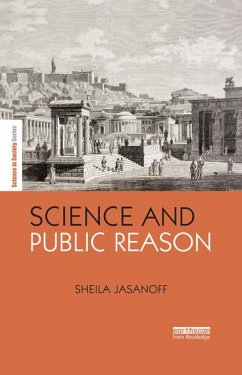This book offers an empirically detailed, cross-nationally comparative account of the institutional logics and practices through which modern democratic governments construct public reason, that is, the forms of evidence and argument designed to persuade publics that legal and policy decisions are founded on reliable knowledge and expertise.
Dieser Download kann aus rechtlichen Gründen nur mit Rechnungsadresse in A, B, BG, CY, CZ, D, DK, EW, E, FIN, F, GR, HR, H, IRL, I, LT, L, LR, M, NL, PL, P, R, S, SLO, SK ausgeliefert werden.
'This collection brings together a quarter century of writing by Sheila Jasanoff on the sources and impacts of science and technology. In showing how they permeate public life, she demonstrates also that the field of Science and Technology Studies is no arcane speciality, but a research field of sweeping significance for law, history, administration, and the social sciences. At stake in the interactions of science with democratic institutions is public reason itself.' - Theodore M. Porter, Department of History, UCLA, USA
'This book fascinatingly asks: What begins where all that seems solid, all that modernity has created, melts into air, leaving no shared ground to stand on? Sheila Jasanoff's exciting answer: a new age and style of public reason that can shed surprisingly clear light on a world in turmoil.' - Ulrich Beck, University of Munich, Germany & L.S.E, U.K
'No one has contributed as much as Sheila Jasanoff to furthering our understanding of the importance of law in the complex relationships that develop between politics and technoscience. Science and Public Reason is more than a collection of her most significant articles on the subject; this seminal book opens entirely original perspectives on what, in a globalized world, a new alliance between science, techniques and democracy could and should be.' - Michel Callon, Ecole des mines de Paris, France
'Sheila Jasanoff's latest book demonstrates, once again, why she is at the very forefront of her field.' - Bruce Ackerman, Yale University, USA
"Professor Sheila Jasanoff's superb treatise Science and Public Reason, part of Earthscan's Science in Society Series, is a wonderful book describing, through a collection of her essays and articles from the past 25- years, the rise of the field of Science and Technology Studies. The book could not have arrived soon enough, as we now globally face the triple threat of 1)massive biodiversity loss, 2) nutrient cycling disruption (greenhouse gases, Montreal Protocolgases, nitrogen fertiliz er caused eutrophication, etc.), and 3) water quality degradation (saltwater intrusion, depleted aquifers, lack of clean drinking water, etc.).' - Gabriel Thoumi, CFA, Mongabay.com
'Without doubt, the essays put together in the volume are work in immense scholarship. Picking on scientific controversies from Germany, England, the US and India, ranging from mad cow scare to silicone gel breast transplant, Jasanoff creates a mosaic of scientific controversies wherein interplay between science and public reasoning had led to influencing state policies to some extent.' - Sudhirendar Sharma, d-sector.org
'This book fascinatingly asks: What begins where all that seems solid, all that modernity has created, melts into air, leaving no shared ground to stand on? Sheila Jasanoff's exciting answer: a new age and style of public reason that can shed surprisingly clear light on a world in turmoil.' - Ulrich Beck, University of Munich, Germany & L.S.E, U.K
'No one has contributed as much as Sheila Jasanoff to furthering our understanding of the importance of law in the complex relationships that develop between politics and technoscience. Science and Public Reason is more than a collection of her most significant articles on the subject; this seminal book opens entirely original perspectives on what, in a globalized world, a new alliance between science, techniques and democracy could and should be.' - Michel Callon, Ecole des mines de Paris, France
'Sheila Jasanoff's latest book demonstrates, once again, why she is at the very forefront of her field.' - Bruce Ackerman, Yale University, USA
"Professor Sheila Jasanoff's superb treatise Science and Public Reason, part of Earthscan's Science in Society Series, is a wonderful book describing, through a collection of her essays and articles from the past 25- years, the rise of the field of Science and Technology Studies. The book could not have arrived soon enough, as we now globally face the triple threat of 1)massive biodiversity loss, 2) nutrient cycling disruption (greenhouse gases, Montreal Protocolgases, nitrogen fertiliz er caused eutrophication, etc.), and 3) water quality degradation (saltwater intrusion, depleted aquifers, lack of clean drinking water, etc.).' - Gabriel Thoumi, CFA, Mongabay.com
'Without doubt, the essays put together in the volume are work in immense scholarship. Picking on scientific controversies from Germany, England, the US and India, ranging from mad cow scare to silicone gel breast transplant, Jasanoff creates a mosaic of scientific controversies wherein interplay between science and public reasoning had led to influencing state policies to some extent.' - Sudhirendar Sharma, d-sector.org

